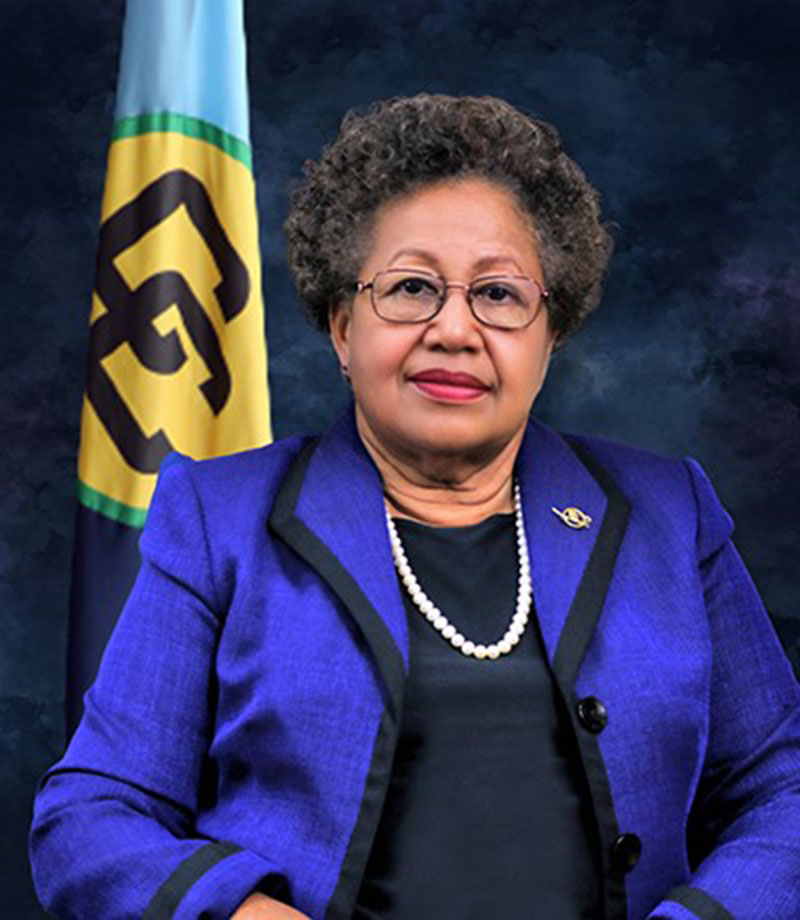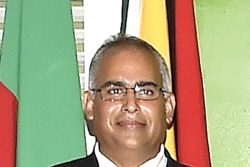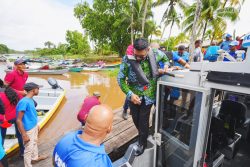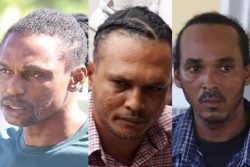(Trinidad Guardian) Caricom Secretary-general Dr Carla Barnett says an action plan to be implemented across the region will be compiled at the end of today’s Caricom Crime Symposium at the Hyatt Regency in Port-of-Spain.
Barnett added that the regional leaders owed this to the citizens of their respective countries, since most Caricom leaders spend a lot of money to fight crime, limiting their financial contributions to other important national goals in the education, health and social services sectors.
“We are in the process of preparing both a declaration and an action plan because it is not only about saying what we need to say, it’s about stating how we’re going to actually get it done. We are organising to ensure we enlist the support, and experts across the region as we proceed forward,” Barnett said on day one of the symposium yesterday.
Earlier, Caricom chairman Philip Davis, Prime Minister of The Bahamas, in his opening address said the crime problem calls for “all hands on deck.”
“An epidemic of violence grips our region, one that claims lives and generates fear and anger,” David said.
“In 2022, Jamaica had a staggering homicide rate of 52.9 per 100,000 inhabitants, Trinidad and Tobago had a rate of 39.4 per 100,000, and The Bahamas, St Lucia and St Vincent and the Grenadines all recorded homicide rates above 30 per 100,000. This is over five times the global average.”
Acknowledging the battle as a complex one, Davis added, “There’s a tangle of social, economic and environmental factors at the heart of this crisis. During these two days of deliberation, we must find the resolve to untangle these layered issues.”
Citing the need for a collective response, Davis added, “Millions of people throughout the region live in crime hotspots, never knowing if they will be a victim on any given day. … Violence spreads like a virus, gaining momentum as one violent crime begets another … Violence is contagious, and those who map the commission of violent crimes find that their data mirrors the spread of infectious diseases within a community.”
He added, “Violence can strike in waves and grow exponentially. Those who come in close contact with violence are most likely to spread it and most likely to fall victim to it.”
Among issues, Davis said the guns used in approximately 70 per cent of violent crimes don’t originate in Caricom countries.
“Every gun used to commit a crime in the Caribbean is smuggled into our countries. In The Bahamas, 98.6 per cent of all recovered illegal firearms can be traced directly to the US. In Haiti, 87.7 per cent of all recovered firearms can be traced likewise. In Jamaica, it amounts to 67 per cent of all recovered firearms and here in T&T it amounts to 52 per cent.
“We’ve asked the US government and US-based gun manufacturers to cooperate with Caricom member states when it comes to identifying weapons purchased in the US, as a part of a wider effort to hold weapons dealers and traffickers accountable for the many lives lost to gun violence each year.
“We must call on our neighbours to the north to better police the trafficking of guns from the US to the Caribbean.”
Speaking on an issue which Prime Minister Dr Keith Rowley raised recently, Davis added, “Last month, The Bahamas, along with Antigua and Barbuda, St Vincent and the Grenadines, Trinidad and Tobago and Mexico, working along with the Latin American and Caribbean
Network for Human Security, jointly filed a brief in the United States Court of Appeal in support of a $10 billion lawsuit to hold US gun manufacturers liable for the destruction American-made guns have caused in our 17 countries.
“It was an action initiated by the Mexican government. We intend to challenge the laws that previously protected gun manufacturers from lawsuits. We’re sending a clear message to the world that we are very serious about fighting gun violence in all forms and on all fronts, not just the home front.
“The Caricom Crime and Gun Intelligence Unit was created to strengthen Caribbean and US collaboration in using data and technology to intercept illegal firearms and traffickers. We must fully leverage this partnership, so that those who put guns on our streets are stopped – and brought to justice.”
Davis added, “I’m hopeful the discussions we initiate today (yesterday) will serve as a launching pad for development of impactful interventions and solutions. There are no quick fixes; yet, we must act quickly to save our people from this epidemic.”







